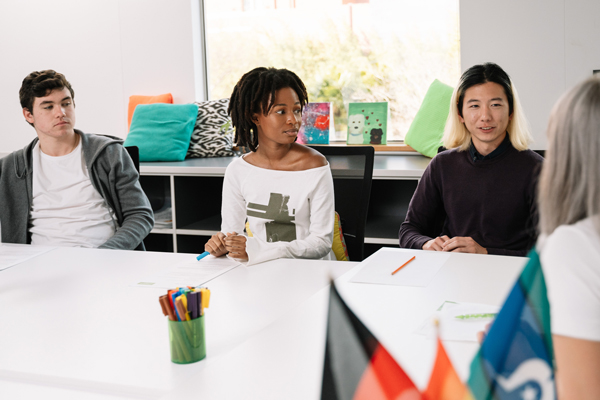Group interviews with multiple other candidates are common in medium to large organisations. This style of group interview might take longer, and include tours, question and answer sessions, and potentially group-problem solving tasks.
It’s common for you to be asked to work together with others on a single problem. This helps a company see how you work with others. The best method for group problem-solving is to avoid being competitive and play to your strengths:
- More of an active leader? Great! Get the ball moving with actions. You can showcase how you can get ideas flowing and keep momentum flowing through a project.
- Bit of a quiet, deep thinker? These people can often see the big picture of a project and can be crucial players in keeping people and the project on track. Look at how you can help the group understand the possible pathways they can take to solve the problem and make sure everyone is agreed on the main goal.
- Love to read people’s personalities and bring people together? People who are great at reading others can help bring different personalities together to get the best out of everyone – like a choreographer or conductor! Let your positive vibes boost everyone’s confidence to find a solution and make sure everyone is heard so you can get the best out of the entire team.
How to prepare for a group interview
There are some basic fundamentals to preparing for a job interview, and they all apply to a group interview. But there are some additional tips for group interviews.
- If you can find out who will be running the interview, research their backgrounds to get an idea of their role and what their interests might be. This can help you guess what kind of questions they’re likely to ask. Don’t hesitate to reach out to the company before the interview and ask who’ll be in the interview.
- Expect questions around how you work across teams. Interviewers from different departments will want to know how you engage with people with different priorities. If you don’t have much experience, that’s fine! Lean on any collaboration experiences you have outside work, like on the sports field or in class.
- Get comfortable talking to multiple people at once. A great candidate will respond to someone’s question but bring in the whole panel through eye contact and even expanding their answer to include other members. The best way to get comfortable is through practice. Get your family/friends to act the part an interviewer and get their feedback on your responses.
Remember, you don’t NEED to have previous experience in all areas. Interviewers want to see your strengths and that you’re open to learning new skills.
Should you be yourself or someone else?
This is a common concern for everyone – even those with decades of experience. If everyone tells you to polish that smile and go in seeking to impress during an interview, does this mean you’re being your authentic self?
The best way to go in confident, positive and true to yourself is to take the pressure off yourself a bit. Remember, job interviews go both ways and it’s just as much about you as it is about them. Write down a bunch of questions you want to ask about the organisation so you can get an idea of how they will help you kickstart and build your career. Having these questions will help you go in more confident and show that you’ve thought deeply about working for them.
For more help preparing for group interviews, reach out to headspace Work and Study. Our team can help prepare you for specific roles and set you up for success!
The headspace Content Reference Group oversee and approve clinical resources made available on this website.
Last reviewed July 2023.
Job Jumpstart. (2023, June 8). Get your group interview basics.
Get professional support
If you feel you need help there are a range of ways we can support you.
